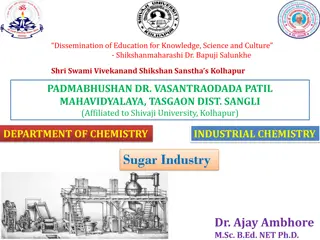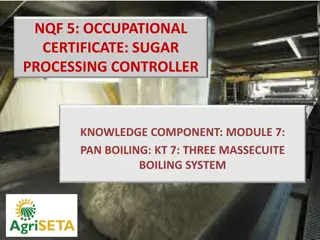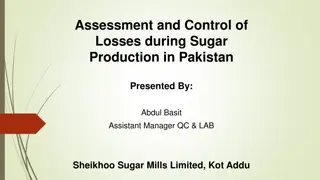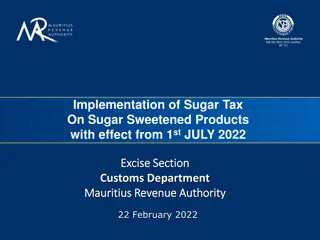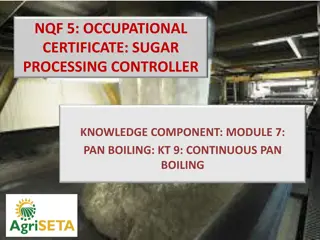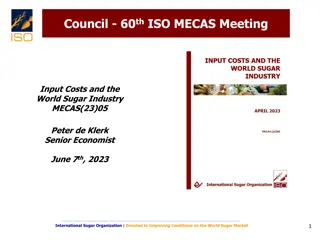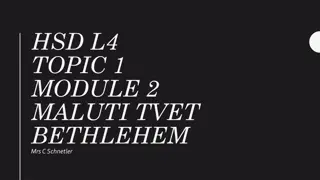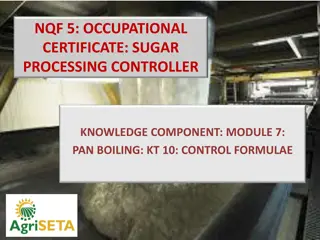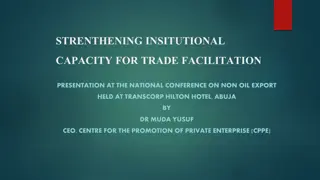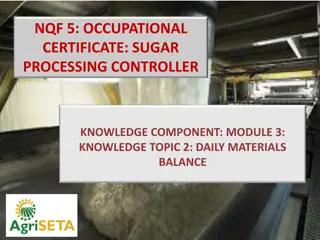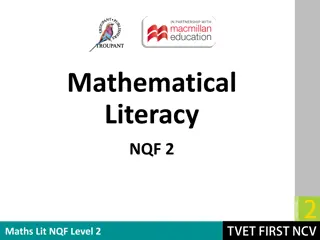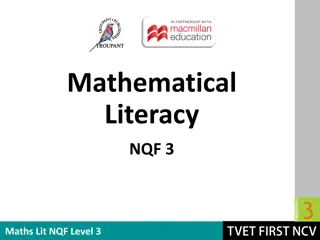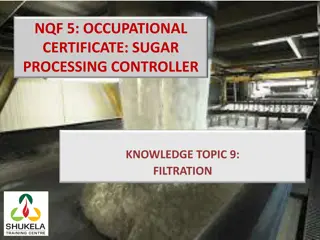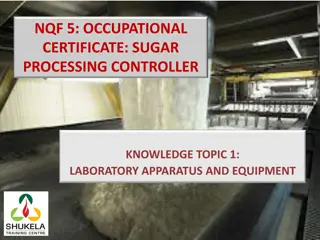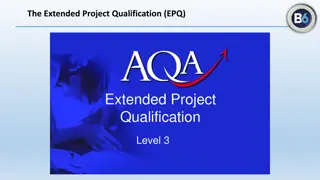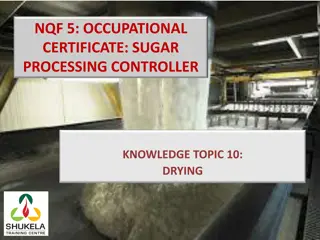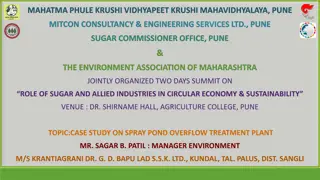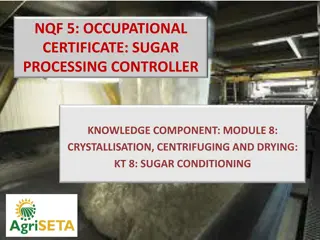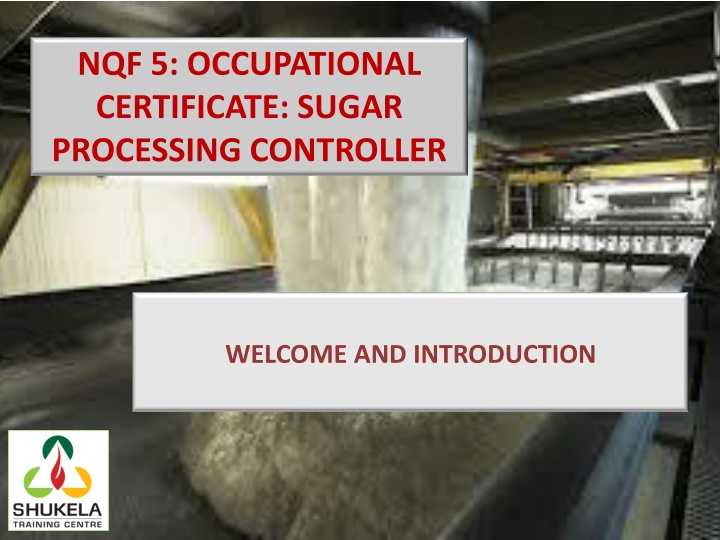
Occupational Certificate in Sugar Processing Controller | Qualification Overview
Prepare to operate as a Sugar Processing Controller, achieving production targets and quality standards in the sugar industry. Gain skills in monitoring, controlling equipment, ensuring operational integrity, and more. This qualification offers a progressive pathway for career development in sugar processing.
Download Presentation

Please find below an Image/Link to download the presentation.
The content on the website is provided AS IS for your information and personal use only. It may not be sold, licensed, or shared on other websites without obtaining consent from the author. If you encounter any issues during the download, it is possible that the publisher has removed the file from their server.
You are allowed to download the files provided on this website for personal or commercial use, subject to the condition that they are used lawfully. All files are the property of their respective owners.
The content on the website is provided AS IS for your information and personal use only. It may not be sold, licensed, or shared on other websites without obtaining consent from the author.
E N D
Presentation Transcript
NQF 5: OCCUPATIONAL CERTIFICATE: SUGAR PROCESSING CONTROLLER WELCOME AND INTRODUCTION
Welcome and Introduction Purpose and objectives of this qualification Qualification rationale Occupational information Learning assumed to be in place and recognition of prior learning Curriculum information Exit level outcomes / learning goals / integrated assessment focus areas Associated assessment criteria Assessment Eligibility requirements for the external assessment Assessment quality partner information Duration of the qualification NQF Level Resource materials Learner assessment plan SAQA registered qualification
Purpose and objectives of this qualification The purpose of this qualification is to prepare a learner to operate as a Sugar Processing Controller. A Sugar Processing Controller achieves production targets and quality standards by monitoring, controlling and responding to operational variables, processing equipment, resources and by ensuring the mechanical integrity of equipment.
Exit Level Outcomes Expected At the end of this Occupational Certificate you should be able to: Control sugar processing equipment to achieve planned sugar outputs that meet product specifications. Control sugar milling operations and resources to achieve efficiency standards. Monitor and enforce compliance with Safety, Health, Environmental Protection and Quality (SHEQ) policies, practices and procedures in a sugar processing plant. Monitor and ensure the integrity of operational equipment and facilities for a sugar processing unit
QUALIFICATION RATIONALE This qualification responds to: The needs of the sugar processing industry For persons controlling the processing operations In a sugar mill or processing plant. The qualification addresses: The industry need to provide knowledge and build competency for future training and Will address the critical labour market need for broadening the pool of qualified persons in the sugar industry Who are tasked with controlling the equipment, processes and standards in the production of sugar.
QUALIFICATION RATIONALE The qualification supports: A progressive pathway for the development of operational staff Employed in a sugar processing and refining plant and Promotes career opportunities in the sector for persons employed at equipment operator level, Aspiring for employment in a managerial position in the sugar processing industry, As well as new entrants.
QUALIFICATION RATIONALE In the past: Training for staff employed in related occupations mainly focused on a range of in-house training programmes offered by individual companies with the support of the SMRI and the technical training facility of SASA, the Shukela Training Centre. This qualification: Recognises past practices that have worked well for the industry over many years, but Further enhances these programmes through the establishment of an occupational qualification that formalises and structures practical and experiential learning components.
OCCUPATIONAL INFORMATION Associated Occupation: 313908: Sugar Processing Controller Occupation or Specialisation Addressed by this Curriculum: 313908000: Sugar Processing Controller Alternative Titles used by Industry: Sugar Process Controller Sugar Processing Superintendent Sugar Processing Foreman Sugar Refinery Foreman Occupational Purpose: Achieves production targets and quality standards by monitoring, controlling and responding to operational variables, processing equipment and resources and by ensuring the mechanical integrity of equipment.
OCCUPATIONAL TASKS Control sugar processing equipment to achieve planned operational outputs within product specifications (NQF Level 5). Control sugar milling operations and resources to achieve efficiency standards (NQF Level 5). Monitor and enforce compliance with, safety, health, environmental protection and quality (SHEQ) policies and procedures in a sugar processing plant (NQF Level 5). Monitor and ensure the integrity of operational equipment and facilities for a sugar processing plant (NQF Level 5).
OCCUPATIONAL TASK DETAILS (1) Control sugar processing equipment to achieve planned operational outputs within product specifications (NQF Level 5). Unique Product or Service: Controlled sugar processing operations Occupational Responsibilities Monitor and control sugar processing equipment Compile and present production reports Occupational Contexts Sugar processing equipment control procedures
OCCUPATIONAL TASK DETAILS (2) Control sugar milling operations and resources to achieve efficiency standards (NQF Level 5). Unique Product or Service Sugar processing resources controlled Occupational Responsibilities: Control sugar milling operations and resources Monitor and direct subordinate performance and conduct Occupational Contexts: Sugar processing production resource control procedures
OCCUPATIONAL TASK DETAILS (3) Monitor and enforce compliance with, safety, health, environmental protection and quality (SHEQ) policies and procedures in a sugar processing plant (NQF Level 5). Unique Product or Service: Occupational and environmental risks controlled Occupational Responsibilities: Enforce compliance to Safety, Health, Environmental protection and Quality standards Perform and respond to in-line quality tests and reports Occupational Contexts: Safety, health, environmental protection and quality compliance procedures
OCCUPATIONAL TASK DETAILS (4) Monitor and ensure the integrity of operational equipment and facilities for a sugar processing plant (NQF Level 5). Unique Product or Service: Functional equipment assured Occupational Responsibilities: Inspect and coordinate maintenance of equipment Occupational Contexts: Mechanical equipment functionality and availability assurance processes
Learning assumed to be in place Entry Requirements Learners are required to have the following in order to be considered for admission: A Senior Certificate issued by the Department of Education ABET Level 4 qualification with Communication and Mathematical Literacy with 5 years work experience in a Sugar Processing plant. Or NCV at NQF Level 4 Operations Management
Recognition of Prior Learning RPL for access to the external integrated summative assessment: Accredited providers and approved workplaces must apply the internal assessment criteria specified in the related curriculum document to establish and confirm prior learning. Accredited providers and workplaces must confirm prior learning by issuing a statement of result or certifying a work experience record. RPL for access to the qualification: Accredited providers and approved workplaces may recognise prior learning against the relevant access requirements.
Curriculum Structure This qualification is made up of: A Knowledge component (92 credits) A Practical Skills component (58 credits) A Work Experience component (76 credits)
Knowledge Modules (1) 313908000-KM-01, Introduction to sugar processing laboratory work, NQF Level 4, Credits 8 313908000-KM-02, The sugar manufacturing process, NQF Level 5, Credits 12 313908000-KM-03, Sugar processing factory control calculations, NQF Level 5, Credits 12 313908000-KM-04, Sugar juice extraction, NQF Level 4, Credits 4 313908000-KM-05, Sugar juice handling and clarification, NQF Level 4, Credits 4
Knowledge Modules (2) 313908000-KM-06, Evaporation, NQF Level 4, Credits 8 313908000-KM-07, Pan Boiling theory and technology, NQF Level 5, Credits 8 313908000-KM-08, Crystallisation, Centrifuging and Drying, NQF Level 4, Credits 4 313908000-KM-09, Water and effluent treatment, NQF Level 4, Credits 4 313908000-KM-10, Sugar refining, NQF Level 5, Credits 4
Knowledge Modules (3) 313908000-KM-11, Operations management, NQF Level 5, Credits 12 313908000-KM-12, Safety, Health, Environment, Risk and Quality Control, (SHERQ), NQF Level 5, Credits 8 313908000-KM-13, Mechanical maintenance, NQF Level 5, Credits 4
Practical Skills Modules (1) 313908000-PM-01, Monitor and control sugar processing equipment, NQF Level 5, Credits 16 313908000-PM-02, Control sugar milling operations and resources, NQF Level 5, Credits 8 313908000-PM-03, Monitor and direct subordinate performance and conduct, NQF Level 5, Credits 8 313908000-PM-04, Enforce compliance to Safety, Health, Environmental protection and Quality standards, NQF Level 5, Credits 6
Practical Skills Modules (2) 313908000-PM-05, Conduct and respond to in-line quality tests and reports, NQF Level 5, Credits 8 313908000-PM-06, Inspect and coordinate maintenance of equipment, NQF Level 5, Credits 8 313908000-PM-07, Compile and present production reports, NQF Level 4, Credits 4
Work Experience Modules 313908000-WM-01, Sugar processing equipment control procedures, NQF Level 5, Credits 28 313908000-WM-02, Sugar processing resource control procedures, NQF Level 5, Credits 16 313908000-WM-03, Safety, health, environmental protection and quality compliance procedures, NQF Level 5, Credits 16 313908000-WM-04, Mechanical equipment functionality and availability processes, NQF Level 4, Credits 16
Exit Level Outcomes/Learning Goals At the end of this course you should have the ability to: Control sugar processing equipment to achieve planned operational outputs within product specifications (NQF Level 5) (50%). Control sugar milling operations and resources to achieve efficiency standards (NQF Level 5) (15%). Monitor and enforce compliance, safety, health, environmental protection, quality and procedures in a sugar processing plant (NQF Level 5) (25%). Monitor and ensure the integrity of operational equipment and facilities for a sugar processing plant (NQF Level 5) (10%).
Assessment Criteria: ELO 1 (1) Knowledge of sugar processing technology, equipment and processes in the control of equipment is applied. Cane yard operations are controlled and co-ordinated to ensure required cane supply to the mill whilst minimising cane delay. Extraction operations are controlled and co-ordinated to maximise sugar recovery. Juice clarification operations are controlled and co-ordinated to minimise turbidity and sucrose losses. Juice evaporation operations are controlled and co-ordinated to satisfy factory requirements. Pan Boiling operations are controlled and co-ordinated to produce sugar of consistent quality within specification and to minimise sugar losses in molasses.
Assessment Criteria: ELO 1 (2) Centrifugation operations to achieve the required sugar molasses quality are controlled and coordinated. Knowledge of the application of mass and energy balances to control sugar processing operations is applied. Factory performance figures to optimise factory operations through liaison with relevant parties are monitored, assessed and used. Equipment utilisation and procedures (e.g. start-up, shut down, purging, cleaning, lock out, emergency stop, shift handover) for a sugar processing line are controlled. Instrumentation readings on equipment operation within required specifications and adjustments to equipment settings where required are monitored and controlled. A consistent flow and availability of material at the required volumes and quality standard over various sugar processing stages is achieved.
Assessment Criteria: ELO 2 Knowledge of operational management to control a sugar processing plant is applied. Production demands by planning, scheduling and monitoring sugar processing operations and resources requirements are met. Labour requirements for specific production runs are met and shift rosters are drawn up. Subordinate performance in accordance with accepted industrial relations practices and supervisory concepts are monitored and directed
Assessment Criteria: ELO 3 (1) Knowledge of Safety, Health, Environment and Quality control concepts are applied. Knowledge of risk assessments is utilised to monitor and control operational activities in a sugar process plant. Knowledge of the various in-line analytical methods to determine quality indicators such as Pol, Brix and Purity values are applied. Quality standards are monitored and achieved through inspections, using sensory cues, in-line analysis of samples and interpretation of laboratory reports. Laboratory activities are integrated with process requirements through liaison with relevant parties. Sugar process samples are analysed and interpreted.
Assessment Criteria: ELO 3 (2) Sampling practices are monitored and controlled to ensure reliability and validity of results. Quality reports are analysed for deviations and required corrective measures are formulated and acted upon. Incident/accident investigations are conducted in accordance with procedures and regulatory requirements. Actual or potential unsafe work practices or conditions through structured inspections are identified. Safety procedures are executed (lockdown, emergency shutdown, emergency evacuation, restricted access to high risk areas) and adherence is enforced. Statutory safety, health and environmental protection inspections, registers, records and reporting standards are maintained.
Assessment Criteria: ELO 4 Equipment are inspected for mechanical soundness and compliance with safety, health, environmental and quality assurance requirements. Maintenance requests (not scheduled) are generated and work done is evaluated by inspections, spot checks and machine runs. The execution of standard equipment care and lubrication procedures to ensure operational functionality are monitored. Equipment records of functionality, utilisation and downtime per category/incident/equipment are maintained.
Integrated Assessment Integrated formative assessment: The skills development provider will use the curriculum to guide them on the stipulated internal assessment criteria and weighting. They will also apply the scope of practical skills and applied knowledge as stipulated by the internal assessment criteria. This formative assessment leads to entrance into the integrated external summative assessment.
Integrated summative assessment An external integrated summative assessment, conducted through the relevant QCTO Assessment Quality partner is required for the issuing of this qualification. The external integrated summative assessment will focus on the exit level outcomes and associated assessment criteria. The learner will be provided with case studies and/or scenarios for the external assessment event. The learner will prepare a presentation on the case studies and or scenarios that will be delivered to assessors during a panel assessment. The assessors will be appointed for every registered assessment site and will be persons that were not involved as facilitators of learning.
Eligibility Requirements for External Assessment In order to qualify for the external summative assessment learners must: Have a copy of a completed and signed Statement of Work Experience Proof of successful completion of all the Knowledge, Practical and Work Experience components (or alternative programmes where applicable).
ASSESSMENT QUALITY PARTNER INFORMATION Name of the body: AgriSETA Address of body: AgriSETA House, 529 Belvedere Road, Arcadia, Pretoria, 0083 Contract person name: QCTO Manager Contact person work telephone number: 012 301 5600
DURATION OF THE QUALIFICATION This qualification consists of 230 credits which is equivalent to 2 300 notional hours. Time for each component is allocated as follows: The Knowledge Component (10%): The Practical Component (20%) The Workplace Component (70%)
ARTICULATION This qualification articulates horizontally to the: National Diploma in Maintenance of High-speed Production Processes at NQF Level 5. Higher Certificate in Supervisory Management at NQF Level 5. National Certificate in Generic Management at NQF Level 5. This qualification articulates vertically to the: National Diploma in Food Technology at NQF Level 6. Advanced Certificate in Management at NQF Level 6.
KNOWLEDGE COMPONENT RESOURCE MATERIALS Qualification Guide (Master) This guide provides an overview of the whole qualification, credits, notional hours, resources needed, alignment matrix and assessment overview. Learner Qualification Summative Assessment Tool (POE) Summative assessment provides the method of assessment that takes place throughout the training programme. Knowledge Component Learning Resources (Textbooks: 13 Sections) Knowledge Component Learner Formative Assessment Guides (Workbooks: 13 Sections)
PRACTICAL COMPONENT RESOURCE MATERIALS Practical Component Learner Guide Practical Component Learner Log Book
WORK EXPERIENCE RESOURCE MATERIALS Workplace Component Learner Statement of Work Experience Workplace Component Mentor Guide
Assessment Plan What? What is it that the learner will be assessed in? The learner will be assessed against the Learning Objectives and their relevant Assessment criteria of the Occupational Certificate: Sugar Processing Controller. There are three components to the Occupational Certificate: A Knowledge Component A Practical Component A Workplace Component
Assessment Plan - Knowledge Component What will be expected from the learner during Knowledge Component formative assessment? The learner must complete ALL the activities in each Learning and Activities Guide (Workbooks - there are 13) during the course of the learning. Do NOT leave blank activities. Write in pen at all times. The learner must sign and date the pages where requested. The learner must complete a written assessment at the end of each Knowledge Module (there are 13).
Assessment Plan Practical component What will be expected from the learner during the Practical Component Formative Assessment? The learner must enable an instructor to sign off on all the activities in each Practical Component Learner Log Book (there are 7) during the course of the practical component. The learner and instructor must sign and date the pages where requested.
Assessment Plan Work Experience Component What will be expected from the learner during the Work Experience Component? The learner must enable a mentor to sign off on the Work Experience Component Learner Statement of Work Experience following the guidance provided in the Work Experience Component Mentor Guide. No assignments are stipulated in the Work Experience Modules.
Integrated External Summative Assessment The completion of the Knowledge, Practical and Workplace Component Formative assessments leads to entrance into the integrated external summative assessment. An external integrated summative assessment is conducted through the relevant QCTO Assessment Quality partner and is required for the issuing of this qualification. The external integrated summative assessment will focus on the exit level outcomes and associated assessment criteria. The learner will be provided with case studies and/or scenarios for the external assessment event. The learner will prepare a presentation on the case studies and or scenarios that will be delivered to assessors during a panel assessment. The assessors will be appointed for every registered assessment site and will be persons that were not involved as facilitators of learning.
Assessment Plan Where? The Knowledge Component Formative Assessment learning activities will take place at an accredited and registered training centre in the training room under the supervision of the facilitator during the Knowledge Component period of the programme. Assessment during the Knowledge Component will be under the direction of an assessor. The Practical Component Formative Assessment activities will take place at an accredited and registered Practical Assessment Centre under the supervision of an instructor during the Practical Component period of the programme. The Work Experience activities will take place at an accredited and registered Work Place under the supervision of a mentor or supervisor. The Integrated External Summative Assessment will take place at an accredited and registered training centre.
Assessment Plan Who? Yourself The evidence collecting facilitator(s): Their role is to guide and support the learner in the collection of the evidence during the course of the programme. The assessor(s): The assessor(s) will evaluate all the formative evidence of assessment that the learners include in their Learning and Activities Guides as well as the written assessments at the end of every module. Their task is to determine whether the learner shows competency in the learning goals of the programme. The assessors will also provide feedback to the learners in case they need to submit additional evidence of their competence. The moderator: If moderation is required the moderator will do spot checks on evidence and make sure that the assessment process has been completed correctly. Instruction to Learners: Please fill in the names and contact details of the relevant people in the space provided in the Qualification Guide.
Assessment Plan When? When do assessments take place? The Knowledge Component Formative Assessment activities are completed during or after each of the Knowledge Modules and as instructed by the facilitator. Formative written assessments will take place at the end of every Knowledge Module and as directed by an assessor. Formative Assessment for the Practical Component is on- going during the Practical Component as directed by an instructor. Formative Assessment for the Work Experience Component is on-going during the Work Experience Component and as directed by a mentor or supervisor. The Integrated External Summative Assessment will take place at the end of the Learning Programme and as directed by the Programme Manager (as assigned by the Training Centre).
Assessment Plan How? How will the learner be assessed, and what kinds of assessment instruments will be used? Formative assessment Formative assessment includes a series of learning activities provided in the Learning and Activities Guide (for the Knowledge Component) and in the Log Book (for the Practical Component). The Statement of Work Experience will be completed during the Work Experience Component. Summative Assessment Candidates are required to complete an Integrated External Summative Assessment at the end of the programme.
Assessment Plan What do you need? For formative assessment the learner will need: The Learning and Activities Guides (There are 13 in the Knowledge Component and 7 in the Practical Component). The Learning Resources (There are 13 in the Knowledge Component and 7 in the Practical Component). Stationery Resources as indicated in the Learning and Activities Guides. For the Integrated External Summative Assessment the learner will need: The Summative Assessment Tool which will include the case studies and/or scenarios for the external assessment event. Your Learning Resources Stationery to be able to produce a presentation
Assessment Plan When is the process complete? What will happen once the learner has completed the assessment process? The learner will receive formal written feedback from the assessor. They need to read it carefully and sign it off. It is important to complete the supplementary activities or re- assessment as communicated by the assessor to be able to reach competence. The process is only complete after the learner has received feedback and a final competence declaration from the assessor.
Assessment Plan What if ? (1) What if the learner is not ready to be assessed? If the learner feels that they are not ready to be assessed, they should contact the evidence collecting facilitator to make alternative arrangements. The learner should also inform the assessor via email of the reasons why they feel that they are not ready for assessment, and confirm what alternative arrangement has been agreed. The learner must provide a copy of their written request to the assessor.

